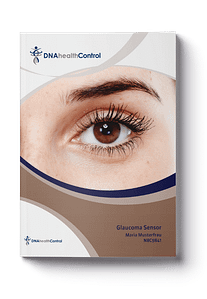Glaucoma Sensor
Genetic Analysis
GENETISCHE BEURTEILUNG DES GLAUKOMRISIKOS
The Glaucoma Sensor uses genetic analysis to determine whether there is an increased risk of developing glaucoma.
Glaucoma Sensor
The Glaucoma Sensor at a glance:
- Analysis of the gene relevant for glaucoma
- Evaluation of the individual glaucoma risk
- Evaluation of the effect of 17 drugs based on the gene profile
- Reliable testing by our laboratory
- Written report with all results
- Concrete recommendations for action based on the test results
Glaucoma causes irreversible damage
Glaucoma is widespread. It is estimated that about 500,000 people suffer from glaucoma in Germany alone. Glaucoma causes irreversible damage to the nerve fibers of affected people and even leads to a complete loss of vision in about 10 percent of all people affected.
Timely treatment can reliably prevent permanent damage in most cases. Early diagnosis is therefore essential, which is why the necessary examinations should not be left out.
The influence of genes on the risk of glaucoma
Glaucoma develops slowly and is not noticed by those affected for a long time. By the time vision is noticeably impaired, the majority of existing photoreceptors are permanently destroyed.
It is now known that a particular gene has a decisive influence on the probability of developing glaucoma. A genetic test can, therefore, help to identify individual risks and, if necessary, arrange for appropriate eye examinations.
This is how the Glaucoma Sensor works
As part of the Glaucoma Sensor, we analyze the sample sent in in our laboratory. We investigate the LOXL1 gene relevant to glaucoma. In addition, we are investigating whether the genetic profile influences the effect and tolerability of 17 relevant drugs.
In this way, we can determine the patient’s genetic glaucoma risk and whether a detailed examination of the eyes is appropriate.
After the successful completion of the analysis, we prepare a clear, written evaluation. In this, we present our results in detail.
Thus, our Glaucoma Sensor can make an important contribution to the early detection of glaucoma and help to prevent permanent eye damage with the right preventive measures.
How it works:
Receive the saliva collection kit (either by post or through your provider)
Follow the instructions to take your saliva sample.
The sample is returned to the laboratory for testing (prepaid envelope included)
Receive results by post and/or by email or through your provider
Experience the future of genetic testing with Novogenia Laboratory
Every analysis is a step towards a healthier and more informed life. Interested in partnership?
✅ SCIENCE AVAILABLE ON GENES
✅ SCIENCE AVAILABLE ON RECOMMENDATIONS
❌ PROGRAM BASED ON LOGICAL CONCLUSIONS
❌ CUSTOMER FEEDBACK ON EFFECTIVENESS GIVEN
❌ INTERNAL EXPERIMENTS HAVE PROVEN ITS EFFECTIVENESS
❌ EXTERNAL STUDIES HAVE PROVEN THE EFFECTIVENESS OF THE RECOMMENDATION

This analysis is not offered by Novogenia.
It is created and sold by our partner
company DNA PLUS –
Zentrum für Humangenetik GmbH in Germany.
You might be also interested in

ShapePlus
Genetic Weight Loss Analysis.
Gain a personalized understanding of the genetic factors influencing your weight management journey.

VitalityPlus
Genetic Weight and Nutrition Analysis.
Receive detailed answers on how your genetic makeup influences your weight loss goals and nutritional choices.

LifestylePlus
Comprehensive Genetic Wellness Evaluation.
Gain a personalized understanding of the genetic factors influencing your weight management journey.
Important Information
We do not sell our products directly to end customers, but we would be pleased to hear from you so that we can recommend a suitable partner in your area.


